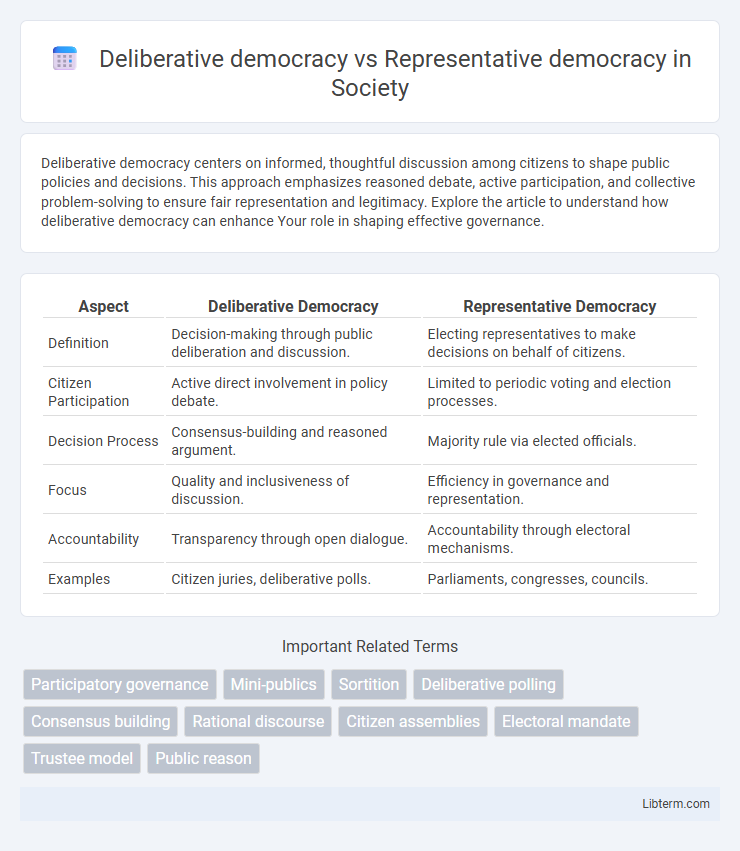Deliberative democracy centers on informed, thoughtful discussion among citizens to shape public policies and decisions. This approach emphasizes reasoned debate, active participation, and collective problem-solving to ensure fair representation and legitimacy. Explore the article to understand how deliberative democracy can enhance Your role in shaping effective governance.
Table of Comparison
| Aspect | Deliberative Democracy | Representative Democracy |
|---|---|---|
| Definition | Decision-making through public deliberation and discussion. | Electing representatives to make decisions on behalf of citizens. |
| Citizen Participation | Active direct involvement in policy debate. | Limited to periodic voting and election processes. |
| Decision Process | Consensus-building and reasoned argument. | Majority rule via elected officials. |
| Focus | Quality and inclusiveness of discussion. | Efficiency in governance and representation. |
| Accountability | Transparency through open dialogue. | Accountability through electoral mechanisms. |
| Examples | Citizen juries, deliberative polls. | Parliaments, congresses, councils. |
Understanding Deliberative Democracy
Deliberative democracy centers on informed, reasoned discussion among citizens to shape public policies, emphasizing transparency, inclusiveness, and collective decision-making processes. Unlike representative democracy, which relies on elected officials to make decisions, deliberative democracy fosters direct citizen engagement and dialogue to achieve consensus or well-considered majority decisions. This model enhances democratic legitimacy by prioritizing discourse quality and mutual understanding in governance.
Core Principles of Representative Democracy
Representative democracy centers on electing officials who act on behalf of citizens, ensuring political accountability and the protection of individual rights through periodic, free, and fair elections. Core principles include political pluralism, rule of law, and separation of powers to prevent abuses and promote transparency. This system relies on responsive governance where representatives deliberate and make decisions aligned with the electorate's interests and societal needs.
Historical Backgrounds and Evolution
Deliberative democracy traces its roots to ancient Athens, where public debate and consensus-building in assemblies shaped collective decisions, evolving notably through Enlightenment thinkers like Rousseau who emphasized direct citizen engagement. Representative democracy emerged in medieval Europe, adapting to larger, more complex societies by delegating decision-making authority to elected officials, culminating in modern constitutional frameworks such as the U.S. Constitution and British parliamentary systems. The evolution of both models reflects shifting socio-political contexts, with deliberative democracy gaining prominence in contemporary discourse on participatory governance and democratic legitimacy.
Key Differences between Deliberative and Representative Models
Deliberative democracy centers on public reasoning and inclusive dialogue where citizens actively engage in discussion to shape policy decisions, emphasizing transparency and consensus-building. Representative democracy relies on elected officials to make decisions on behalf of the people, prioritizing efficient governance and accountability through periodic elections. Key differences include the participatory depth, with deliberative models fostering direct citizen involvement in policy formation, while representative models focus on delegation and political representation.
Citizen Participation in Both Systems
Deliberative democracy emphasizes direct citizen engagement through structured discussions and consensus-building forums, fostering informed public participation in decision-making. Representative democracy relies on elected officials to act on behalf of citizens, limiting direct public involvement but ensuring governance through periodic elections. Citizen participation in deliberative democracy tends to be more active and continuous, while in representative democracy, it is typically intermittent and indirect.
Decision-Making Processes Compared
Deliberative democracy emphasizes inclusive, reasoned discussion among citizens to reach consensus, fostering transparent decision-making through extended public dialogue and critical debate. Representative democracy relies on elected officials to make decisions on behalf of the populace, streamlining governance but potentially limiting direct public participation and deliberation. The decision-making process in deliberative democracy prioritizes collective reasoning and legitimacy derived from citizen engagement, whereas representative democracy focuses on efficiency and accountability through chosen delegates.
Strengths and Weaknesses of Deliberative Democracy
Deliberative democracy emphasizes thoughtful discussion and reasoned debate among citizens, enhancing informed decision-making and fostering public trust through transparency and inclusivity. Strengths include promoting deeper understanding of issues, encouraging diverse perspectives, and improving legitimacy of outcomes by engaging participants directly in the decision process. Weaknesses involve potential inefficiencies, the risk of unequal participation due to time or resource demands, and challenges in scaling deliberative practices in large, diverse populations.
Strengths and Weaknesses of Representative Democracy
Representative democracy offers the strength of efficient decision-making through elected officials who can manage complex governance on behalf of large populations, ensuring accountability via regular elections. However, its weaknesses include the potential disconnect between representatives and constituents, risking underrepresentation of minority interests and reduced public engagement. The system may also foster political polarization and influence from special interest groups, which can undermine the democratic process.
Real-World Examples and Case Studies
Deliberative democracy emphasizes direct citizen participation in decision-making processes, as seen in the Citizens' Assemblies in Ireland that successfully influenced abortion law reform. Representative democracy relies on elected officials to make decisions on behalf of constituents, exemplified by the United States Congress managing national policies. Comparative case studies highlight that deliberative models enhance public engagement and legitimacy, while representative systems offer efficiency and scalability in large populations.
Future Prospects and Challenges
Deliberative democracy offers future prospects in enhancing citizen engagement by fostering informed public discourse and collective decision-making, which can address democratic deficits prevalent in representative models. However, challenges include scaling deliberation processes to larger populations and integrating diverse viewpoints without causing decision-making gridlock. Representative democracy must adapt to increasing demands for transparency and participatory mechanisms while balancing efficient governance and broad public accountability.
Deliberative democracy Infographic

 libterm.com
libterm.com